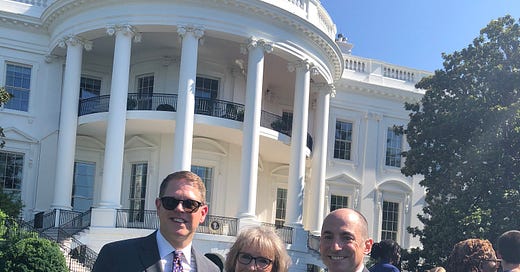A Small Light in a Vast Darkness
The Bipartisan Safer Communities Act isn’t a cure-all, but a good first step
To say the last few months have felt chaotic would be a major understatement. Many Americans continue to struggle to keep up with rising costs of basic necessities like food, fuel, and housing. Back-to-back rulings handed down by the Supreme Court have caused controversy and uncertainty about the future of both reproductive rights and the government’s ability to reduce carbon emissions and help slow climate change. And it seems like the tears shed over one senseless mass shooting barely have time to dry before we have to mourn over another, and another.
I realize I spill much digital ink drawing attention to what I see as societal shortcomings or policy failures as they relate to mental health – and, let’s face it, our leaders certainly aren’t perfect. But I also believe in recognizing progress, however marginal – those increasingly rare instances when common ground is identified, and where our federal legislators bridge the partisan divide for the sake of accomplishing something that will actually help people.
Earlier this week, I had the privilege of attending an event at the White House with President Biden and others to celebrate the landmark passage of the Bipartisan Safer Communities Act. The president also announced 21 additional executive actions that his administration is undertaking to proactively address the rise in gun violence in America, including a joint effort from the Departments of Defense, Justice, Homeland Security, and Veterans Affairs to reduce suicidality among service members and veterans by limiting access to firearms.
Though ostensibly it was a gathering to mark a historic achievement, I was in solemn company on the White House lawn, as many of the attendees were survivors of mass shootings or had lost someone close to them to an incident of gun violence. “I can’t thank you enough for your willingness to continue to fight for other families,” President Biden said. “Nothing can bring back your loved ones, but you did it to make sure other families don’t have to experience the same loss and pain that you’ve experienced.”
The Bipartisan Safer Communities Act, signed into law by President Biden on June 25, represents the most significant federal gun reform legislation in almost thirty years. Its provisions include billions in funding for community violence prevention programs, enhancing background checks for gun buyers under 21, and closing the so-called “boyfriend loophole” that can allow physically abusive partners to purchase firearms. This in itself is no small feat in the only country that can claim to have more guns than citizens, and the only country amongst its peers where guns are the leading cause of death among children.
With a spate of successive mass shootings gripping our national consciousness and fueling the fiery gun control debate, it’s understandable that those aspects of the bill would get the most media attention. But the Bipartisan Safer Communities Act also has much to be excited about from a mental health advocacy standpoint.
Among the Act’s provisions are measures and investments that will dramatically increase access to mental health care. Notably, it gives $150 million to support the new 988 Suicide and Crisis Lifeline, which goes live nationwide this Saturday and is in dire need of increased funding. It also appropriates $120 million to prepare and train community members and first responders on how to appropriately and safely respond to individuals experiencing mental health crises. This type of training will be invaluable as we endeavor to move away from armed law enforcement as the standard response to behavioral health emergencies.
In addition, the Act addresses the mental health crisis facing America’s youth. It improves oversight of Medicaid’s Early and Periodic Screening, Diagnostic and Treatment (EPSDT) program to strengthen children’s access to comprehensive mental health services, which is needed. It includes funding to increase youth access to telehealth services. And it includes $1 billion to fund, implement and staff school-based mental health education and intervention programs.
Some people are already criticizing the bill and its Congressional authors for not doing enough to meet this moment, and there’s a reasonable argument for that. The unfortunate reality is that significant concessions likely had to be made in order to achieve the necessary bipartisan consensus. Yet, it's important to note that no single piece of legislation, no matter how well-intentioned or broadly supported, is going to serve as an ultimate panacea to resolve our nation’s mental health crisis. That resolution will only come when systemic policy reforms are combined with a robust, diverse mental health work force and equitable access to quality care for all Americans.
Do I wish the Bipartisan Safer Communities Act offered more for our citizens’ mental health care? You bet I do. Do I think it could do more on the issue of gun safety? Absolutely! Do I think there’s more work to be done? I know there is. But at the same time, incremental progress is still progress. As President Biden said to us, “The action we take today is a step designed to make our nation the kind of nation we should be.”






